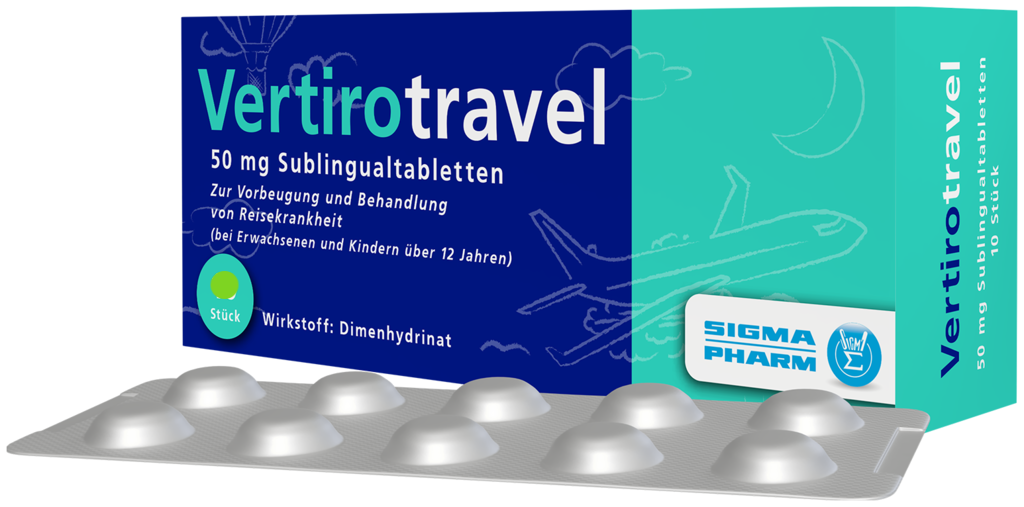Sigmapharm
Vertirotravel 50 mg - 4 sublingual tablets
Vertirotravel 50 mg - 4 sublingual tablets
受取状況を読み込めませんでした
Dimenhydrinate, the active ingredient in Vertirotravel, is a long-established remedy for motion sickness. Dimenhydrinate is an active ingredient from the group of antihistamines. It hinders nerve circuits that transmit impulses - including from the balance organ in the inner ear - to the vomiting center, whereby the typical symptoms of motion sickness (e.g. dizziness, nausea and vomiting) are suppressed or alleviated.
field of use
Vertirotravel belongs to a group of medicines known as antihistamines.
Vertirotravel is used for:
- Prevention and treatment of motion sickness (in adults and children over 12 years old)
The daily dose must not exceed 400 mg.
Contraindications
Vertirotravel must not be used
- if you are allergic to dimenhydrinate or any of the other ingredients of this medicine listed in section 6
- if you are allergic to any medicines known as antihistamines
- if you suffer from glaucoma (increased eye pressure).
- if you have difficulty or pain in emptying your bladder due to enlargement of the prostate gland
- if you suffer from acute asthma
- if you suffer from pheochromocytoma (adrenal gland tumor).
- if you suffer from convulsions (epilepsy).
- if you suffer from cardiac arrhythmias (such as tachycardia or Wolff-Parkinson-White syndrome)
Warnings and precautions
Please talk to your doctor or pharmacist before using Vertirotravel,
- if you have a sugar intolerance
- if you have liver or kidney problems
- if you have asthma
Vertirotravel should be used after meals to minimize any stomach irritation.
You should not consume alcohol or medicines containing alcohol during treatment.
Interactions
Using Vertirotravel with other medicines
Tell your doctor or pharmacist if you are taking, have recently taken or might take any other medicines.
It is especially important to tell your doctor or pharmacist if you are taking any of the following medicines:
- Atropine and/or other atropine substances
- Central nervous system depressors
- Antibiotics that are toxic to the ear
- Medicines that prolong the QT interval in the ECG (antiarrhythmics)
- Sympathomimetics (adrenaline, norepinephrine)
- Monoamine oxidase inhibitors (e.g. isoniazid, isocarboxazid, phenelzine)
- Procarbazine (anti-cancer medicine)
Using Vertirotravel with food, drink and alcohol
You should not drink alcohol or take medications containing alcohol during treatment with Vertirotravel.
Pregnancy, breast-feeding and fertility
If you are pregnant or breast-feeding, think you may be pregnant or are planning to have a baby, ask your doctor or pharmacist for advice before using this medicine.
Vertirotravel should not be used during the third trimester as it has the property of causing premature uterine contractions (labor). In the first six months of pregnancy, Vertirotravel may only be used if the benefits clearly outweigh the risks. Your doctor will decide whether you
can use this medicine.
Dimenhydrinate, the active ingredient in Vertirotravel, passes into breast milk. To date, no long-term negative effects have been noted in breastfed babies. However, if your child shows signs of discomfort or restlessness, switch to bottle feeding or stop treatment with Vertirotravel and ask your doctor for advice.
Driving and using machines
Warning: This medicine may impair the ability to react and drive.
Vertirotravel can cause dizziness. Drinking alcohol or taking medicines that contain alcohol can increase this effect. Caution is required when driving vehicles or operating machines.
Application
Always use this medicine exactly as your doctor or pharmacist has told you. Check with your doctor or pharmacist if you are unsure.
This medication should be used sublingually (by placing it under the tongue until it dissolves without water). Do not chew or swallow.
The recommended dose is:
50 mg to 100 mg (1 - 2 sublingual tablets), 3 or 4 times daily. The first dose should be taken at least 30 to 60 minutes before travel. The maximum dose is 400 mg per day.
Side effects
Like all medicines, this medicine can cause side effects, although not
everyone gets them.
If you experience any of the following side effects, stop using this medicine and get medical help immediately:
Allergic reactions (rare: may affect up to 1 in 1,000 people)
- Rash, red or purple spots on the skin (purpura), itching
- Edema (swelling of the face or neck that may be associated with difficulty breathing)
- anaphylactic shock
Common: may affect up to 1 in 10 people
- Headache
- Dry mouth
- Difficulty urinating
- Drowsiness, reduced alertness, sleepiness (especially noted at the start of treatment)
- Mydriasis (dilation of the pupil)
- Irregular heartbeat
Uncommon: may affect up to 1 in 100 people
- dizziness
- myasthenia (a condition that causes muscle weakness)
- Increased intraocular pressure
- Balance problems, memory or concentration difficulties (more common in older people)
- Confusion, hallucinations (seeing or hearing things that aren't really there)
- sleep disorders
- Difficulty moving, involuntary muscle movements
Rare: may affect up to 1 in 1,000 people
- Restlessness, nervousness
- constipation
- Vision problems
- Drop in blood pressure when assuming an upright position
Very rare: may affect up to 1 in 10,000 people
- Abnormal body movements in children (extrapyramidal symptoms)
- Significant reduction in white blood cells (leukocytes). Symptoms of this can include fever and possible sensitivity to various infections.
- Hemolytic anemia (abnormal reduction in red blood cells (erythrocytes))
- Thrombocytopenia (abnormal reduction in blood platelets), which may cause nose or gum bleeding.
Not known: Frequency cannot be estimated from the available data
- Drainage of milk secretion
Other side effects:
- Temporary numbness of the tongue during sublingual administration
composition
The active ingredient is dimenhydrinate.
Each sublingual tablet contains 50 mg dimenhydrinate.
The other ingredients are:
microcrystalline cellulose, mannitol, methacrylic acid - methyl methacrylate copolymer (Eudragit L100), sodium starch glycolate - type A, vanilla flavor, saccharin, highly disperse anhydrous silicon dioxide, magnesium stearate, levomenthol, talc.
Usually ships out within 3-4 business days
Share


